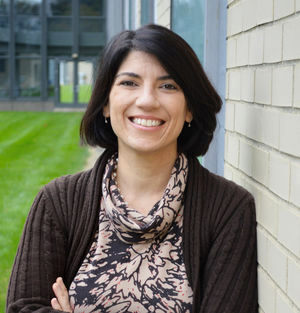Ed. note: This post is part of the Spotlight on Commerce series highlighting the contributions of Department of Commerce employees during Women’s History Month.
Guest blog post by Judith Mitrani-Reiser, Director of the Disaster and Failures Studies Program, National Institute of Standards and Technology
I was always drawn to numbers. When I got to college, I knew I wanted to study engineering, but I didn’t know which type. During my freshman year at the University of Florida in Gainesville, I developed a love of civil engineering. It may be because a lot of the men in my family are civil engineers, and I saw it as a natural progression. Also, my father was in graduate school in Cuba for civil engineering when we left during the Mariel boatlift in 1980. He didn’t get to complete his degree, so maybe a little bit of my enthusiasm for the profession came from my hope that I could complete his dream.
I’ve been at the National Institute of Standards and Technology (NIST) for the past year and a half and have found it extremely rewarding. I’m the Director of the Disaster and Failures Studies Program within NIST’s Engineering Laboratory. Our program has three main thrusts: carrying out the statutory responsibilities assigned by the National Construction Safety Team Act, developing standards and protocols for field work in response to disasters and structural failures, and overseeing a disaster metrology research program. The program’s overarching objective is to improve the safety and structural integrity of buildings and other structures.
Before coming to NIST, I was a faculty member in the Departments of Civil Engineering and Emergency Medicine at The Johns Hopkins University in Baltimore, Maryland. Early during my tenure at Hopkins, the Earthquake Engineering Research Institute (EERI) invited me to participate in the reconnaissance of Chile’s 8.8 magnitude earthquake in 2010. It was my first time in the field and I led a small team of researchers to assess the earthquake’s impacts on hospitals.
That trip made me a much better scientist because firsthand experiences provide insights you cannot replicate in a lab or on a computer. You can’t imagine the feelings you get when you see a large building collapse as if it were made out of LEGO®. It stays with you and makes you want to do your best to ensure that never happens again. NIST has given me the opportunity to do the kind of work I enjoy, but at a much larger scale: for all natural hazards and construction failures, and across all building types.
I’ve never been as engaged in Women’s History Month as I have this year. I’ve been tweeting about it almost daily. I love the opportunity to celebrate the wonderful work women are doing now, but also what they’ve done in the past that has not been celebrated for decades—or for centuries!
I have two girls of my own, and every night I read to them from Good Night Stories for Rebel Girls because I want them to go into their dreams thinking of some strong, courageous woman. I accept the responsibility and the challenge of mentoring young women in all facets of my life. Our society’s messaging to young girls is not perfect, and I hope I’m affecting a new generation by showing them you can and should have it all.
I like supporting activities that engage young girls in STEM. I love working with Girl Scout troops—I actually started doing that before my own daughters were scouts. There’s an emergency preparedness patch program that was created by the Girl Scout Council of the Nation's Capital in collaboration with FEMA. Through this program, I’ve taught many girls about understanding disasters and emergencies, why you need to prepare for them, and how. I like to teach them Morse code with flashlights and whistles, and also a bit of earthquake engineering along the way.
My advice for women who want to go into engineering: don’t undervalue yourself or your work. If you do good work and have a good understanding of your value, you’ll always be well positioned for success.


